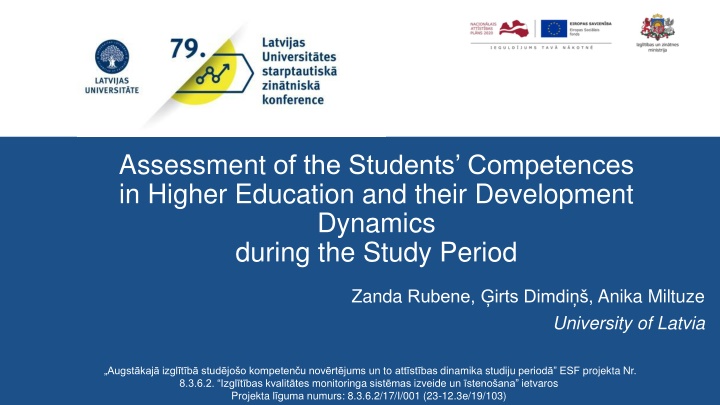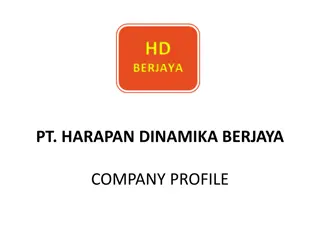
Assessment of Students' Competences in Higher Education and Development Dynamics
Explore the assessment of students' competences in higher education and their development dynamics during the study period at the University of Latvia. This project aims to bridge the gap between university graduates' competences and the skills required for the economy, focusing on transversal competences alongside professional competences.
Download Presentation

Please find below an Image/Link to download the presentation.
The content on the website is provided AS IS for your information and personal use only. It may not be sold, licensed, or shared on other websites without obtaining consent from the author. If you encounter any issues during the download, it is possible that the publisher has removed the file from their server.
You are allowed to download the files provided on this website for personal or commercial use, subject to the condition that they are used lawfully. All files are the property of their respective owners.
The content on the website is provided AS IS for your information and personal use only. It may not be sold, licensed, or shared on other websites without obtaining consent from the author.
E N D
Presentation Transcript
Assessment of the Students Competences in Higher Education and their Development Dynamics during the Study Period Zanda Rubene, irts Dimdi , Anika Miltuze University of Latvia Augst kaj izgl t b stud jo okompeten unov rt jums un to att st bas dinamika studiju period ESF projekta Nr. 8.3.6.2. Izgl t baskvalit tes monitoringa sist mas izveide un steno ana ietvaros Projekta l guma numurs: 8.3.6.2/17/I/001 (23-12.3e/19/103)
Topicality of the project A New Skills Agenda for Europe ( European Commission, 2016) shows that one of the most topical problems in modern higher education is the gap between the competences of university graduates and the knowledge and skills required for the economy. Therefore, universities need a better understanding of the achievements of university graduates. The European Commission supports and promotes the development of student competence assessment frameworks for different areas of higher education in order to ensure a comparable assessment of students and graduates' skills. Transversal competences have been cited as equally important as professional competences, as evidenced by the crisis caused by Covid 19.
Topicality of the project In order to solve the above mentioned problem, at the end of 2019 the Ministry of Education and Science and the University of Latvia signed a cooperation agreement on the implementation of the project Assessment of Students' Competences in Higher Education and their Development Dynamics during the Study Period . The aim of the research is to study students' transversal competences - research, innovation, entrepreneurship, digital and global, as well as civic competence - to find out the dynamics of their development in the following fields of study: RIS 3, creative industries, public administration and education. Development of a tool for assessing teachers' professional competences as an example of a test measuring professional competences. The first phase of the project will end in August 2021.
27 leading researchers, researchers, experts and research assistants from 8 universities company: LU, LiepU, RTA, RTU, RSU, DU, JVLMA, University of Groningen (Netherlands), educational company Lielv rds . and 1
First results Transversal competences have been conceptualized and defined, their structures have been developed. Within the framework of the project, a master's thesis has been defended, several scientific articles have been prepared and published, and two international seminars have taken place with the participation of Finnish and Dutch professors. A tool for assessment of students' transversal competences has been developed, its approbation process is underway, at least 500 students with different study experience will participate in it (257 at the moment). A tool for assessing the professional competences of teacher education students has been developed, the approbation of which will start already in February 2021.
Challenges The developed transversal competence questionnaire is very voluminous it takes about two hours to complete. How to motivate students to get involved? To supplement the indicators for the assessment of the dynamics of the development of students' competences in the quality monitoring system of the higher education; set of indicators of learning outcomes (impact on human resources). Professional responsibility and autonomy as an indicator to bridge the gap between academic knowledge and labor market requirements.
Professional Autonomy The term, ProfessionalAutonomy , has been ubiquitous since the World Medical Association Declaration of Madrid on Professional Autonomy and Self-Regulation (1987). ProfessionalAutonomy means the quality or state of being independent and self-directed, especially in making decisions, enabling professionals to exercise judgment as they see fit during the performance of their jobs. How can this be evaluated empirically? We return to the systemic analysis of literature - to understand experience of measuring the professional autonomy in research.

